How to Stay Healthy Longer
It's not just about extending your life—it's also about how to continue feeling good in the years ahead. Here, the head-to-toe tuneup that will help.
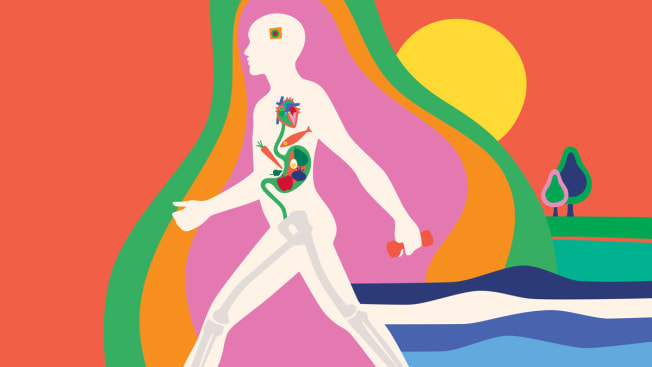
Well past ages 80 and 90, some people still haven’t slowed down.
They’re publishing books, entering bodybuilding competitions, earning degrees, racing boats, and socializing with family and friends who are decades younger.
While that used to be almost unthinkable, it’s becoming more common. Much of what we’ve learned about thriving in one’s later years is relatively recent knowledge. That’s because today, life expectancy is 26 years longer than it was in the 1950s.
And the longer you live, the longer you’re likely to keep on living: A baby born today in the U.S. has a life expectancy of about 76 years. Someone who has reached 40 is projected to live to almost 79, and a 60-year-old is expected to live to 82. If you’re 80 now, chances are you could live to nearly 89.
"We’ve gotten quite good as a medical community at extending life span," says Emily J. Rogalski, PhD, a clinical and cognitive neuroscientist and professor of psychiatry and behavioral sciences at Northwestern University Feinberg School of Medicine in Chicago. The big challenge now is that our health span—how long we live with generally good health—"is not always keeping up."
Age remains the No. 1 risk factor for chronic illnesses such as cancer, heart disease, and neurodegeneration. But researchers are actively working out the very best ways to stave off age-related illness and decline, and people who have an excellent quality of life in their 80s and 90s are helping to lead the way.
All this means there’s a good chance your later years will be richer than you might have imagined decades ago. "There’s tremendous potential," says Rogalski, who studies "super-agers": people 80 and older with memory (and often health) equal to adults in their 50s and 60s. While some factors are out of your control, a big part of how you feel and what your life looks like 10 or 20 or 30 years in the future depends on what you are doing right now.
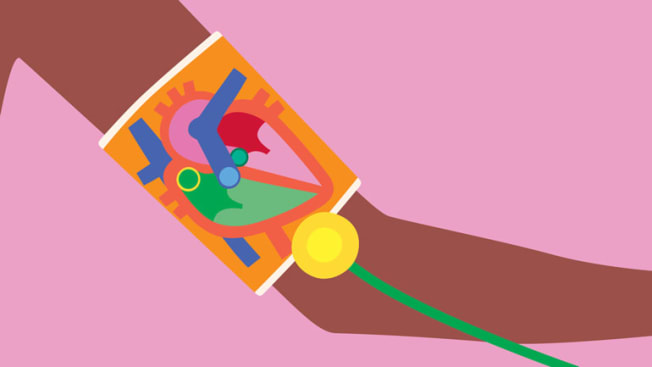
Illustration: Kari Modén Illustration: Kari Modén
Your Heart
What happens as you age: The heart becomes less efficient at pumping blood through the body, which can limit your ability to exercise and, eventually, to engage in normal daily activities, says Scott L. Hummel, MD, a cardiologist and director of the Heart Failure with Preserved Ejection Fraction program at the University of Michigan’s Frankel Cardiovascular Center in Ann Arbor. Blood vessels also tend to stiffen over time, which can lead to hypertension. The more you can keep risk factors for heart disease in check throughout life, the "younger" your heart and cardiovascular system will remain as you get older.
Key signs of trouble: Many early symptoms of heart disease are not obvious, so keep an eye on your cardiovascular fitness—especially for signs of a rapid falloff. If activities that were once easy (such as walking a certain distance at a brisk pace) are now a struggle, your doctor may be able to help. Also, be alert to signs of a possible emergency that warrants a 911 call, including chest pain and shortness of breath.
What can help: The American Heart Association lists eight essential factors, including diet (the best evidence is for the Mediterranean and DASH diets, which include produce, whole grains, beans and legumes, healthy fats, fish, and poultry); physical exercise; avoiding nicotine; getting 7 to 9 hours of sleep; managing your body mass index, blood sugar, and blood pressure; and controlling cholesterol.
The more of these habits you engage in throughout life, the longer you live and the longer you live free from diseases—including heart disease and other chronic ills of aging, such as diabetes, Hummel says. These steps can improve health at any age, and can even reverse the effects of arterial stiffness and lower the risk of heart attack.
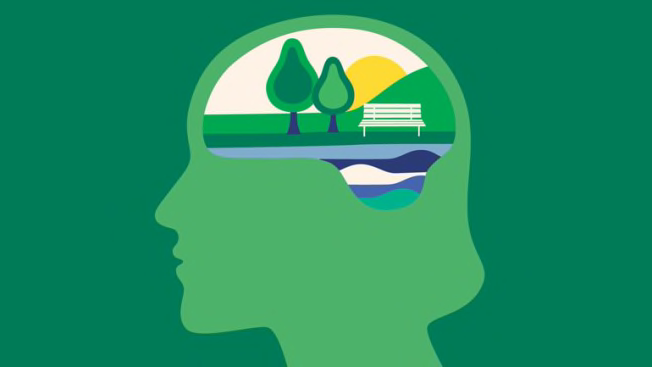
Illustration: Kari Modén Illustration: Kari Modén
Your Brain
What happens as you age: Some aspects of cognition, including vocabulary, can grow throughout a person’s life, and plenty of older people are writing books and picking up new languages or hobbies, says Julia Adamian at NYU. But typically, cognitive performance peaks in the 30s or 40s, says Emily J. Rogalski at Northwestern. "On average, what we see is there’s some decline with each decade beyond that," she says.
Still, many people are at their most creative and productive in their 50s and early 60s, thanks to their ability to combine cognitive skills with accumulated knowledge and wisdom, says James E. Galvin, MD, founding director of the Comprehensive Center for Brain Health and a professor of neurology, psychiatry, and behavioral sciences at the University of Miami Miller School of Medicine.
As you get older, processing speed and reaction time slow down, Galvin says. So it might take a bit longer to find the right word, or multitasking might become more difficult. Vision and hearing—which are both important for brain health—sometimes weaken. And then after age 80, your risk of developing mild memory problems or dementia rises. Some super-agers, however, seem to be able to avoid even normal age-related cognitive slowing. "You would never believe [these people] are over age 80," Rogalski says, adding that they seem decades younger.
Key signs of trouble: If you start to notice memory changes—for instance, that you’re forgetting recent activities or events, are finding it hard to understand conversation, or are losing your mathematical abilities—talk to your doctor. Do the same if you experience weakening vision, or challenges walking and talking. "Not all changes are due to age," Galvin says. "You don’t want to sit at home and let something fester."
What can help: About 40 percent of Alzheimer’s disease and age-related dementia cases could be prevented or delayed through lifestyle changes, according to the Centers for Disease Control and Prevention. These behaviors, which are also good for your heart, include not smoking, avoiding excessive alcohol use, getting plenty of exercise, following an eating plan like the Mediterranean or DASH diet, treating mental health issues, and keeping blood sugar and blood pressure in check. The earlier you start adopting such habits, the better, Galvin says—though it’s never too late. In addition, research suggests that having positive beliefs about aging—such as feeling that you are as useful as you were in your younger years—is linked with a significantly lower likelihood of developing dementia.
Exposure to green spaces, such as forests and parks, seems to help, too, Galvin says. Socializing and learning new things (such as an art or a language) also appear to be important, according to Rogalski. Activities like dancing can be especially helpful, Adamian says; dancing involves moving with a partner while processing music and rhythm—quite the cognitive challenge. Finally, despite plenty of persuasive marketing, there’s insufficient evidence supporting any supplements to bolster brain health, Galvin says.

Illustration: Kari Modén Illustration: Kari Modén
Your Digestive System
What happens as you age: Age-related changes in the cardiovascular system can potentially inhibit blood flow to the gut and the liver—the organ that helps eliminate toxins from your body. Smooth muscle cells in the gut may grow stiffer over time, which can make it harder to stay regular, says Jean-Pierre Raufman, MD, a professor of medicine and chief of gastroenterology at the University of Maryland Medical System in Baltimore. There could also be a decline in the cells that help make the mucous lining of the gut, which may result in your stomach becoming more sensitive to certain foods. In addition, the composition of "good" and "bad" bacteria in your gut microbiome changes over time, though the implications of this are still largely unknown, Raufman says.
Key signs of trouble: Two of the most common problems that can occur in the later years are constipation and gastroesophageal reflux disease (GERD), characterized by persistent heartburn. And while people might chalk these up to age, Raufman says both conditions can be successfully treated in the vast majority of people. Liver trouble can be hard to spot, which is why having liver function tested as part of your annual checkup is important. You’ll want to make a doctor’s appointment right away if you notice dark urine, jaundice (yellowish skin or eyes), loss of appetite, or unexplained nausea.
Other signs that might indicate potentially serious gastrointestinal problems include blood in the stool (one possible sign of colon cancer, which is increasingly occurring in younger people) and difficulty swallowing (which could indicate esophageal cancer). Such symptoms warrant an appointment with the doctor as soon as you notice them.
What can help: Fortunately, many of the digestive issues that come up with age can be addressed with dietary changes. Eating more fiber—adults should get at least 14 grams for every 1,000 calories they eat—can help significantly with constipation. (For comparison, a cup of oats has 8 grams of fiber, and a third of an avocado has 3 grams.) Fiber supplements may help if dietary changes aren’t doing the trick, Raufman says—though some animal studies suggest inulin fiber supplements could damage the liver.
Your gut relies on a rich vascular system, so anything that provides cardiovascular benefits, like exercise and a heart-healthy diet, is probably helpful for your digestive system. If you’re struggling with GERD, then eliminating alcohol, quitting smoking, and not eating for 3 hours before bed may ease symptoms. It can also be useful to sleep on your left side or with your head or upper body elevated.

Illustration: Kari Modén Illustration: Kari Modén
Your Hormones
What happens as you age: Levels of growth and sex hormones drop. Some of these changes have been associated with declines in muscle and bone strength (more on that later), as well as less overall energy, poorer sleep, and reduced sex drive.
By the time you’re about 70, your growth hormone levels might be 30 percent of what they were at their peak, says Anne R. Cappola, MD, a professor of medicine in the division of endocrinology, diabetes, and metabolism at the University of Pennsylvania’s Perelman School of Medicine in Philadelphia. The hormones DHEA and DHEA-S, which can be converted in the body to reproductive sex hormones (testosterone and estrogen), decline to about 20 percent of their peak by the time a person is in their 70s. In men, testosterone levels decline gradually after a peak in their 20s. When a woman goes through menopause, estrogen levels drop significantly.
Key signs of trouble: "It’s normal to get tired sometimes," Cappola says; hormone issues are not necessarily the culprit, though they can play a role. People going through menopause may have symptoms such as hot flashes and night sweats.
What can help: Menopausal hormonal therapy (MHT) can be worthwhile for people with very significant menopause symptoms, but it can increase some cardiovascular risks over time, according to Cappola. Doctors should prescribe the lowest effective dose of estrogen, for only as long as needed, she says. Discuss the form that’s most appropriate for you: Estrogen can be supplemented as a pill, patch, cream, or gel. Your doctor should also check you once a year to see if you should continue or stop. Using MHT for longer than necessary after menopause may increase cardiovascular risk.
Getting sufficient exercise—strength training at least twice a week and 150 minutes per week of moderate cardiovascular exercise—and sleep (7 to 9 hours a night) can increase growth hormone and testosterone levels, Cappola says. But for most people, supplemental growth hormone or prescription testosterone doesn’t appear to help prevent chronic disease, or increase energy or sex drive in the long term, according to Cappola. And in many cases, the risks outweigh the benefits. For example, while testosterone supplementation may improve muscle health in combination with exercise, it also could increase the likelihood of heart disease and prostate cancer.
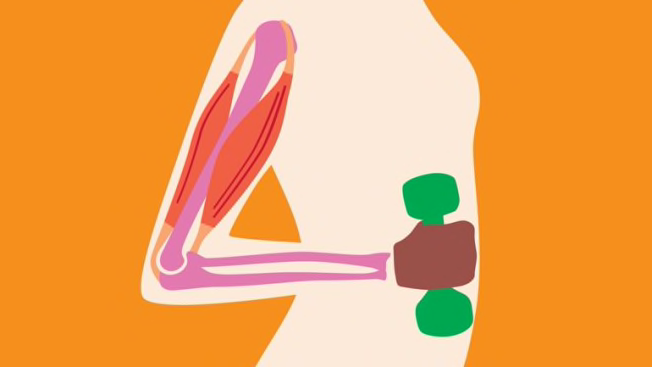
Illustration: Kari Modén Illustration: Kari Modén
Your Muscles and Bones
What happens as you age: Bone strength peaks in your 20s; muscle strength, around age 30. Both begin to slowly decline by your 40s, though exercise can dramatically slow this falloff. Endurance, which requires both physical and mental toughness, tends to peak a bit later than strength and can be maintained for many years. Case in point: One study of marathoners found that people in the 55-to-60 age bracket performed similarly to runners who were 18.
Key signs of trouble: Any sudden pain, weakness, or change in function—like difficulty with regular activities—should be reported to your doctor, says Michael Rogers, PhD, professor of human performance studies and the research director for the Center for Physical Activity and Aging at Wichita State University in Kansas. This includes back pain, which is often treatable, says Steven Flanagan, MD, chair of rehabilitation medicine at NYU Grossman School of Medicine, as well as the joint pain that can signify arthritis. As he says, "What’s the reason to suffer through it?"
In addition, a bone that breaks during what seems like a small accident may be a sign that you need to have your bone health checked with a DEXA scan (see "Which Medical Tests to Take"). Worsening posture could be a sign of muscle imbalances or weakness.
If you don’t exercise regularly and want to monitor your musculoskeletal system more closely, check periodically to see how far you can walk in 6 minutes or how many times you can stand up and sit down in a chair in a minute. A rapid drop in performance on these tests could be a signal of muscle loss or a cardiovascular issue that needs a doctor’s attention.
What can help: "Inactivity is the one thing that’s going to speed up declines," Rogers says. Exercise can make a huge difference: People who work out regularly can have the cardiovascular fitness and muscular strength of a person years younger.
Aerobic exercise is important, but you should prioritize strength and balance workouts as you get older. So find a strength training workout, whether that’s a session with a trainer, a circuit at your gym, or a functional fitness class, that you can do at least a couple of times a week. (You can also go to nia.nih.gov and search for "balance training" and "strength training.") After all, going for a walk becomes much harder if you can’t get up out of a chair or maintain your balance on the go. With any exercise, push yourself a bit beyond the bare minimum so you’ll still be able to get a workout in after any future declines, Rogers says.
For those who need it, physical therapy can help with a range of pain, posture, strength, and balance issues, and prescription drugs can slow the progression of osteoporosis.
Finally, consider whether you might need more protein (important for muscle strength) and calcium (key for bone health). Many people in their 70s and 80s don’t get enough of either. A 150-pound person over 65 may need to aim for 68 to 83 grams of protein per day; people 50 and up need 1,000 to 1,200 mg of daily calcium. It’s best to get calcium from food, like leafy greens and dairy, but if your doctor is concerned about bone loss, calcium supplements may help. For protein, consider not only meat, poultry, and seafood but also plant proteins such as quinoa, soy, lentils, and nuts.
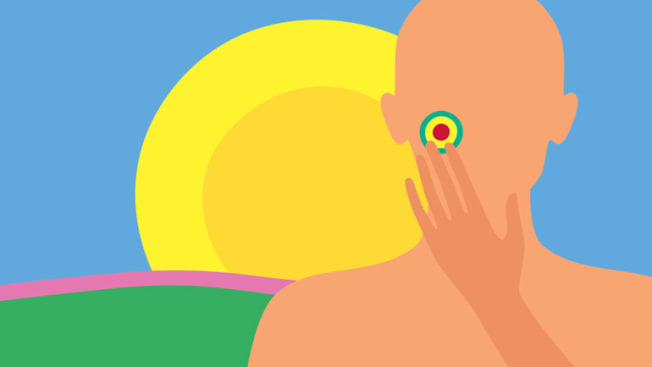
Illustration: Kari Modén Illustration: Kari Modén
Your Skin
What happens as you age: Signs of aging often first appear under the eyes, as people lose collagen and the skin thins, says Karyn Grossman, MD, a dermatologist in Santa Monica, Calif., and New York City. Fine lines and wrinkles start to appear. As decades go on, those lines deepen, and people lose the fat beneath the skin, which can lead to sagging. Skin spots—including moles and freckles, as well as brown age spots—may also appear. "Much of what people tend to think about as old-looking skin are people who have photo [sun] damage to skin," Grossman says. In older adults, itchiness and bruises also become more common and wounds heal more slowly.
Key signs of trouble: Melanoma, the most potentially fatal form of skin cancer, represents 5 percent of all new cancer cases each year. So see your doctor if you notice new or changing moles, or those with irregular, uneven, or asymmetrical borders. Do the same if a wound seems infected or isn’t healing after about a week.
What can help: The most important thing you can do is use sunscreen, Grossman says. "Everybody of all skin colors should be wearing a minimum of SPF 30 every day on all sun-exposed areas," she says. This includes older adults, who often don’t use sufficient sun protection, according to the CDC.
Certain products can mitigate or even reverse signs of skin aging, Grossman says. Research has found that over-the-counter topicals with retinoids (use them at night) can spur the growth of new skin cells and boost collagen, to help reduce skin thinning, fine lines, and wrinkles, she says. Preliminary evidence indicates that collagen supplements may reduce sagginess. And a scent-free daily moisturizer with ingredients such as hyaluronic acid, lanolin, and shea butter can soothe skin itchiness.
Grossman says she’s noticing young people with horizontal neck lines, thanks to time spent staring down at mobile phone and laptop screens, so watch your posture while using devices. (An eye level computer monitor may help.)
Also, keep in mind that aside from checking concerning moles, dermatologists offer treatments for a wide variety of skin issues that might cause discomfort.
Editor’s Note: This article also appeared in the September 2023 issue of Consumer Reports magazine.
















